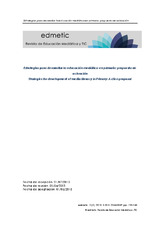Estrategias para desarrollar la educación mediática en primaria: propuesta de actuación
Strategies for development of media literacy in Primary: Action proposal
Autor
Sáez López, José Manuel
García González, José Luis
Editor
Universidad de CórdobaFecha
2013Materia
Alfabetización mediáticaHabilidad tecnológica
Tecnología educativa
Competencia digital
Educación primaria
METS:
Mostrar el registro METSPREMIS:
Mostrar el registro PREMISMetadatos
Mostrar el registro completo del ítemResumen
La competencia digital desempeña un papel fundamental en la formación de
los estudiantes actualmente. Sólo tenemos que considerar que la tecnología es
ubicua en la vida de los estudiantes y también en sus rutinas diarias. Las
escuelas deben plantearse cómo implementar e integrar en el currículo la
tecnología educativa. La alfabetización mediática se refiere al conocimiento y
destrezas que el alumnado debe adquirir para poder analizar, evaluar y crear
mensajes mediáticos. Este artículo trata sobre alumnado entre 8 y 11 años que
no tiene formación multimedia previa, y aprende lo básico sobre la
competencia digital, así como el impacto que esa formación tiene en su
progreso académico. Dada la edad de la muestra, las destrezas mediáticas
trabajadas no han ido más allá de las tecnológicas, aunque algunas
habilidades evaluadoras y críticas se han practicado oralmente. Los resultados
muestran que los estudiantes han mejorado significativamente sus destrezas
básicas y también su conocimiento sobre los media. Sin embargo, no podemos
concluir que una formación tan corta y básica impacte su progreso
académico. Digital competency plays an essential role in students' training nowadays. We
just need to consider that technology is ubiquitous in students' lives and also
part of their daily routines. Schools need to address how ICT is going to be
implemented and integrated into the curriculum. Media literacy refers to the
knowledge and skills individuals are to be achieved in order to analyze,
evaluate, or produce media messages. This article is about how 8 to 11 years
old students with no previous background, learn the basics on ICT and its impact on their grades. Because of students' age, literacy skills do not go
beyond creating media messages, although some critical and evaluative skills
were also orally practiced. Results show that students have significantly
improved their basic skills and also their knowledge on media. However, we
cannot conclude that this type of short in time and basic training impacts their
academic grades.

